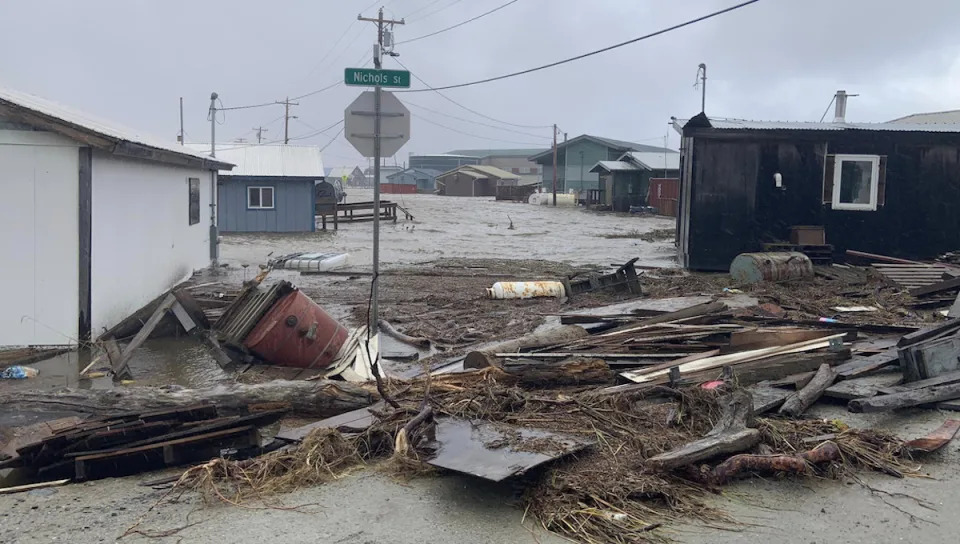CBS News
Alaska towns flooded, residents evacuated as massive storm batters state
Sophie Reardon – September 17, 2022
A massive, potentially record-breaking storm brought major flooding and damage to coastal towns in Alaska Saturday, and some residents were evacuated. Gov. Mike Dunleavy said he “verbally declared” a disaster for communities impacted by the storm.
The center of the storm was making its way up the Bering Strait Saturday afternoon, the National Weather Service said.
On Alaska’s western coast, the towns of Nome, Hooper Bay, Skaktoolik, Kotlik and Nunam Iqua were all hit hard by the storm, according to the Alaska Department of Transportation and Public Facilities (ADOT&PF).
The governor said on Twitter that there had been no reported injuries as of Saturday morning. “We will continue to monitor the storm and update Alaskans as much as possible,” he tweeted. A news briefing was scheduled for 7:30 p.m. local time Saturday night.
The state had also established an emergency operations center.
Rep. Mary Peltola also tweeted Saturday afternoon, asking that Alaskans “please be safe and seek shelter. It’s imperative we all look out for each other and keep each other safe. We will get through this, but stay safe.”

In the town of Golovin, major flooding was reported early Saturday, according to the National Weather Service, and forecasters warned it would only get worse. The town could see an additional 1 to 2 feet of water by the day’s end. The Old Golovin Airport was under water, according to ADOT&PF.
“Water is surrounding the school, homes and structures are flooded, at least a couple homes floating off the foundation, some older fuel tanks are tilted over,” the weather service’s office in Fairbanks tweeted.
Photos from the weather service showed the high water levels there.
Wales – the westernmost town in both Alaska and the U.S., located on the Bering Strait coast – was seeing flooding in “low lying areas,” the weather service reported.
“Water levels will peak this afternoon with the high tide, then gradually fall through Sunday,” the weather service tweeted.
Another town, Shaktoolik, reported coastal flooding, with water “entering the community and getting close to some homes,” according to the weather service. Residents there were evacuated to a school and clinic. Shaktoolik was also expected to see the worst of the storm later in the day.
According to the weather service, the water level in Nome rose above 10 feet Saturday, and is expected to continue to rise.
The weather service also shared footage from a webcam in Unalakleet, comparing an average day in the town against the scene there Saturday morning.
As of Saturday afternoon, large swaths of the state’s western coast were under coastal flooding and high wind warnings. The weather service said flood warnings would remain in effect for several areas through Sunday night, while the wind warnings were expected to expire by Saturday night.
The weather service said the Yukon–Kuskokwim Delta would see a “smaller surge” during high tide in the afternoon and evening hours Saturday.
The “highest water levels are expected from Kipnuk north to Newtok,” the NWS tweeted. A coastal flood warning was extended for that region through 10 p.m. Saturday.

Other portions of the state are under gale warnings, according to the weather service.
The weather service shared peak reported wind gusts as of 8 a.m. local time — the highest recorded was 91 mph in Cape Romanzof. Several other towns, including Golovin, saw winds topping 60 mph.
The storm is the remnants of Typhoon Merbok, and forecasters predicted this week it could bring “potentially historical” flooding, with some coastal areas seeing water levels up to 11 feet higher than the normal high tide.
